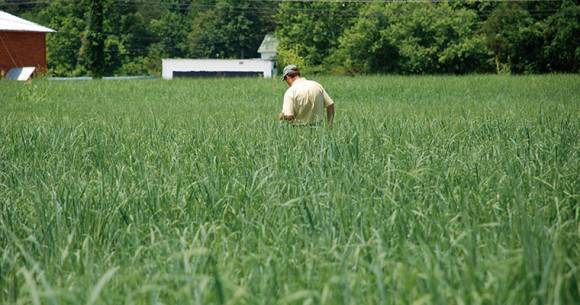Experimental Education
A first-of-its-kind graduate program is pushing beyond the boundaries of a single discipline

Finding solutions to complex energy problems such as storage, sustainability, and the impacts of climate change is vital to the survival of our planet. But because these challenges are affected by so many different factors, a multifaceted approach is required to facilitate new discoveries.
This is why the unique doctorate in energy science and engineering degree administered by UT’s Bredesen Center for Interdisciplinary Research and Graduate Education was established.
“Degrees at universities are primarily disciplinary, but the world around us is becoming more and more interdisciplinary,” says Lee Riedinger, professor of physics and director of the Bredesen Center. “The question we have in higher education is ‘Do disciplinary degrees fill the bill entirely?’ We think the energy arena is one case where maybe it does not.”
The Bredesen Center is named for former Tennessee governor Phil Bredesen in recognition of his leadership in education and economic development for the state. One of his initiatives was to create a joint doctoral program to help grow the already fruitful partnership between UT and Oak Ridge National Laboratory.
“The state legislature gave us a one-time grant of $6.2 million to kick-start the ESE program. We put a lot of that money into recruiting and providing good fellowships so we could recruit the best and brightest from across the country,” Riedinger says.
Once accepted, students partner with a professor or researcher in their field of interest to pursue their objectives while contributing to the efforts of ORNL and UT.
In addition to their primary research focus area, students are required to take an introductory course on energy science and technology and a seminar course that delves into other areas of the ESE program. An entrepreneurial track and a policy track help broaden the curriculum by featuring courses on entrepreneurship; leadership and management; and political, social, and ethical issues related to energy.
In addition to research, Bredesen Center students, faculty, and administration are involved in developing Knoxville’s green economy. They work with entrepreneurs to get people together and exchange ideas about solving energy issues with the hope of forming local industry partnerships.
The graduates of this pioneering program will have the knowledge, tools, and perspective to become the next generation of leaders in energy science and engineering. The big ideas they cultivate have the potential to change the world.
Unfrozen
The Arctic is warming twice as fast as the rest of the planet, and Mallory Ladd wants to understand the environmental repercussions of this trend. As a member of the Next Generation Ecosystem Experiments project at ORNL, she is studying how nitrogen availability affects biogeochemical processes associated with greenhouse gas emissions from warming permafrost soils.
As Arctic temperatures increase, soil microbes begin to decompose the previously frozen carbon-rich organic matter, which may release massive amounts of carbon dioxide and methane into the atmosphere. Ladd’s objective is to improve global climate model predictions by combining lab and field studies of complex ecosystem processes with computer simulations.
The Next Big Idea
When it comes to technology, everyone is looking for the next big thing, and ORNL is no exception. So when Andrew Lepore learned about the lab’s Next Big Idea competition, he jumped at the chance to get his research—a revolutionary catalyst technology capable of converting biomass into bio-oil—in front of the lab’s leadership team.
That decision paid off to the tune of $50,000 when judges selected his idea as one of the most promising. Lepore, who is on track to receive his doctorate in 2016, bested seventeen more seasoned researchers to win the prestigious prize.
From Student to CEO
As a student enrolled in the entrepreneurial track, Beth Papanek experienced first-hand the benefits of the program’s interdisciplinary nature. Her research involves the use of microorganisms to produce biofuels. After learning how to build a business plan around a piece of intellectual property from ORNL’s storehouse, she attended Start-Up Day in Knoxville, where she pitched her plan for a new company to a roomful of entrepreneurs with money to spend.
According to Papanek, people in the audience sent texts immediately saying they would back her. Even though the technology was not quite ready for investment, the experience was invaluable.
For more information, visit the Bredesen Center website.




Leave a comment